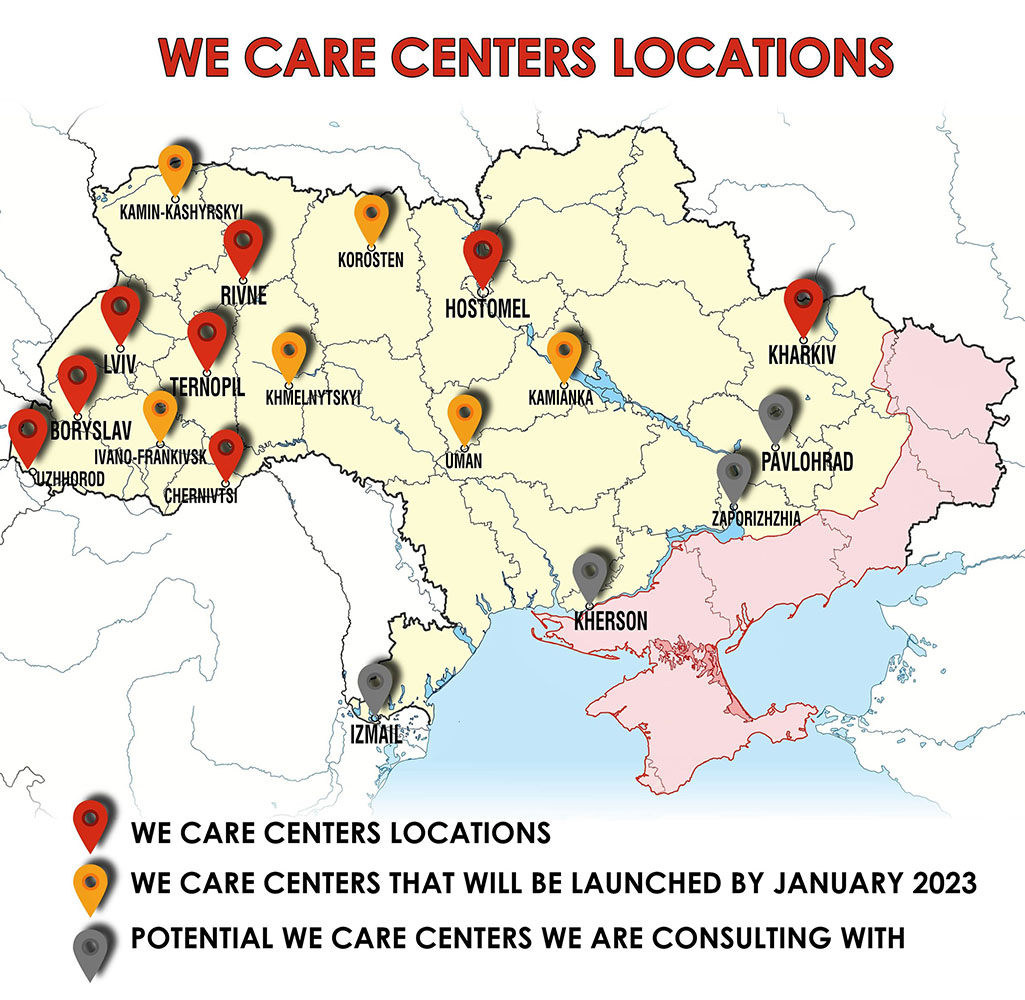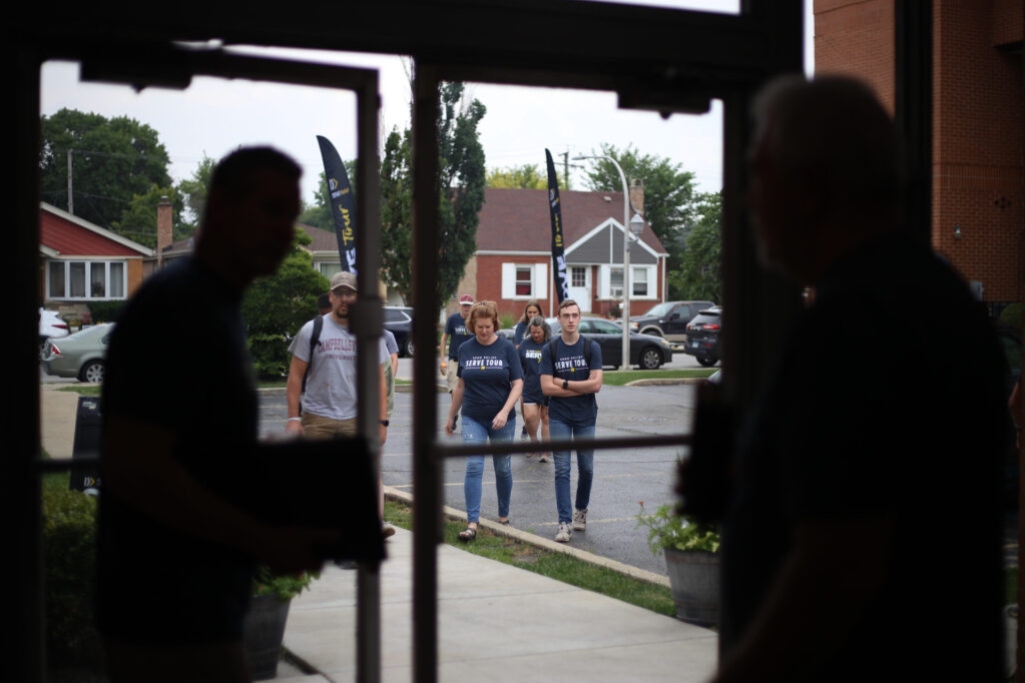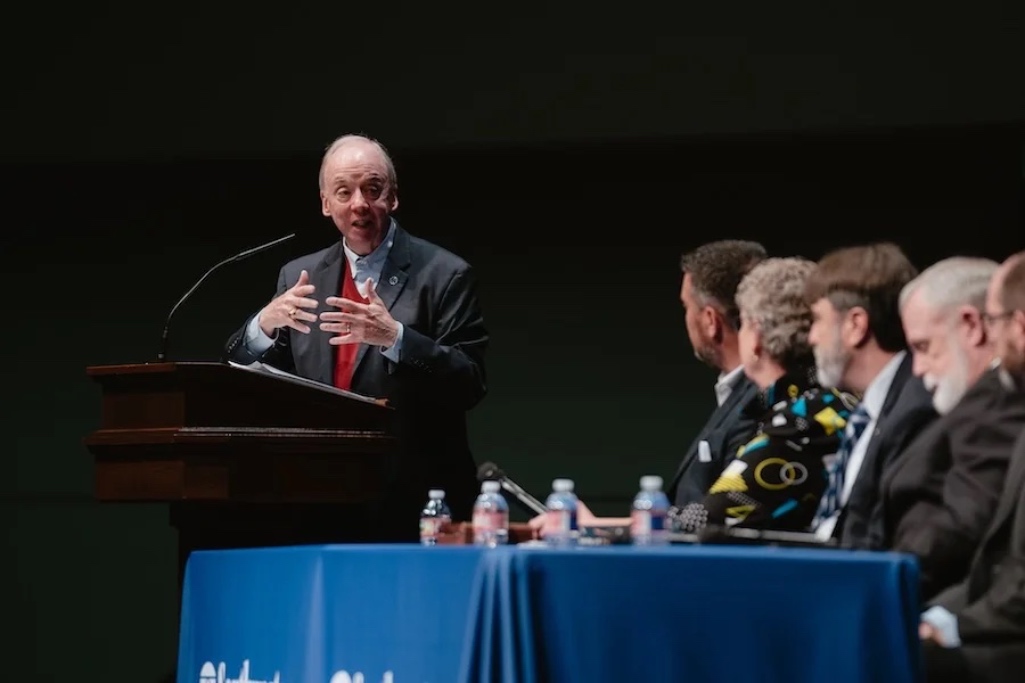
While continuing to educate its students, UBTS is helping Ukraine survive the war by serving at a growing number of humanitarian We Care Centers across the war-torn nation.
LVIV – Celebrating her fourth birthday amid war in Lviv, Ukraine, little Alina wished for electricity.
“A 4-year-old girl, her birthday wish, wants to have electricity all the time,” said Ukrainian Baptist Theological Seminary (UBTS) President Yaroslav “Slavik” Pyzh. “We have issues with electricity because in the last attack, our power plant was hit by Russian missiles.
“She was playing with her grandma and they have this plastic cake with a candle. You blow your candle and you have to come up with a wish.”
Alina, the daughter of Pyzh family friends, considers Slavik and his wife Nadia her grandparents.
Alina’s December birthday wish came as UBTS works with humanitarian We Care Centers to provide generators for heat and lighting, among other essentials including food, clothing, medicines and personal care items. Volunteers are winterizing homes in communities outside Russia’s line of fire.
“God is really merciful to us,” Pyzh said, “because we have one of the warmest winters on record. Today (Jan. 18), it was 45 degrees outside. For us, having 45 degrees outside is unbelievable.
“In eastern Ukraine it’s a little bit colder, but still warm.”
Pyzh thanks God for the warmer temperatures.
“Russia was threatening us that they’re going to freeze Europe and all of us, but it just happens that they have unpredicted cold weather in Russia, and we have unbelievably warm weather in Europe and Ukraine,” he said. “So it seems like God was having a little bit of a sense of humor with them.”
Scheduled and unanticipated power outages are frequent as Russia continues to strike Ukraine’s electrical grid, infrastructure and civilian housing in missile attacks. UBTS has continued to hold classes while simultaneously conducting community-based humanitarian and spiritual aid.
“That’s been a challenge for us, but we equip the seminary with some of the generators so we can run heating and basic electricity for lights and things like that,” he said. “So we can kind of keep up with the loss of electricity to run our classes.”
UBTS is already working with eight We Care Centers across Ukraine, and will launch work in six additional centers Feb. 6.
Since early December, UBTS has supported We Care Centers in helping more than 30,000 people, providing 100 tons of food. In 18 trips to communities in eastern and southern Ukraine, the centers have delivered an additional 36 tons of food in addition to hygiene products, warm clothing and technical equipment.
“With our centers, we have covered all of western Ukraine and are moving into the center of our country,” Pyzh said. “Since the beginning of the war, western Ukraine has hosted several million people and has become a major logistics center, where a large amount of resources continues to be accumulated to cover the needs of internally displaced persons and help the areas that are directly close to the fighting.
“We continue to actively help our army and the military at the front line, taking into account the fact that our students are among them.”
We Care Centers are viewed as increasingly vital as Russia continues attacking critical infrastructure.
Southern Baptist churches and the North American Mission Board’s Send Relief humanitarian ministry are among numerous organizations aiding UBTS in its work.
UBTS volunteers are already working at We Care Centers in Lviv, Rivne, Ternopil, Boryslav, Uzhhorod, Gostomel, Kharkiv and Chernivtsi, and in February UBTS will begin supporting centers in Ivano-Frankivsk, Khmelnytsky, Kamen-Kashyrsky in the Volyn region), Korosten in the Zhytomyr region, and in Uman and Kamianka, both in the Cherkasy region.
UBTS is eyeing other centers in eastern and southern Ukraine, Pyzh said, including Kherson, Izmail in the Odesa region, Zaporizhzhia, and Pavlohrad in the Dnipo region.
Jan. 25-27, UBTS will offer We Care Center training in family counseling and evangelism, and is planning trauma care training in February.
Pyzh, a Southwestern Baptist Theological Seminary alumnus who also pastors The Journey Church in Lviv, encourages Ukrainians to look past the unpredictable reality of the war to their new reality in Christ. He references Paul’s words in encouraging Christians to stand firm in their identity as new creations in Christ.
“That’s kind of the same approach that I’m using, helping people say yes, your life is fragile. Yes, you don’t have any kind of control. Yes, you lost all your security, but God is in control of our life. Our security is not in our hands but in God’s hands.
“We are God’s children, and it doesn’t matter what will happen tomorrow or today or within the next 10 minutes,” Pyzh said. “It’s not going to change our reality with God and our relationship with God.
“That’s something we have to draw our strength from,” he said. “It’s difficult. But I think in present conditions, people are finding strength in the way that God defines them as God’s children.”
(EDITOR’S NOTE – Diana Chandler is Baptist Press’ senior writer.)


